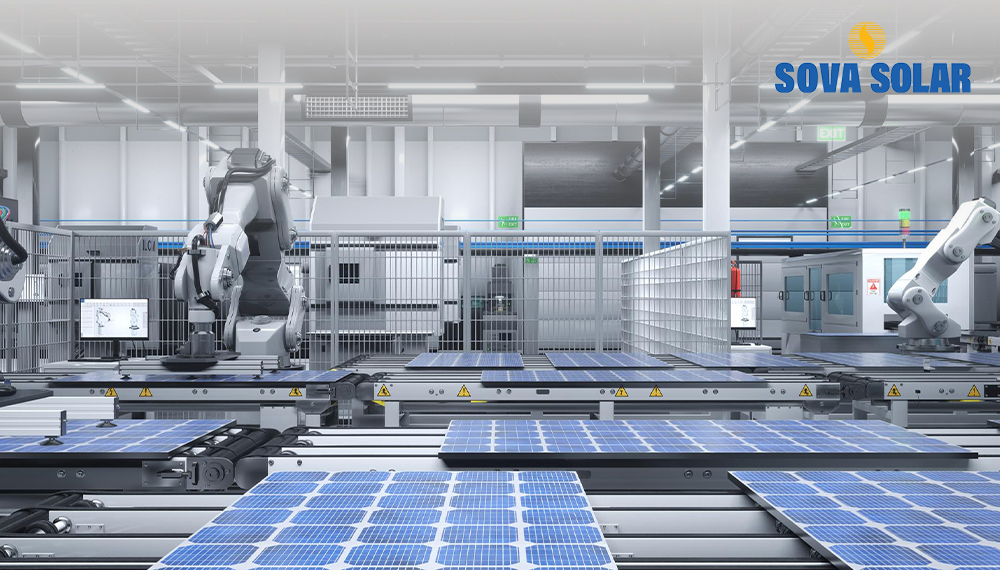
- sovasolar_admin
- Jul 8, 2025
- Uncategorized
- 0 Comments
Choosing to go solar is a smart move for any industrial or institutional facility. It saves money, reduces reliance on traditional energy, and helps the planet. But one of the most important decisions in this journey is choosing the right solar panel manufacturer.
In India, there are dozens of solar brands to pick from—some big, some new, and some unknown. So how do you know which one to trust? A good solar panel isn’t just about power output—it’s about quality, performance, and long-term reliability.
Here’s a simple 6-point checklist that can help you evaluate any solar panel manufacturer in India—and make the best decision for your business.
1. Check the Certifications
Before anything else, check if the manufacturer’s panels have been certified by national and international standards. These certifications tell you the product has passed important safety and quality tests.
Look for:
- IEC certifications (International Electrotechnical Commission) for performance and durability
- CE (Conformité Européenne) for meeting EU standards
- UL for safety compliance in international markets
- MNRE “A” category rating from India’s Ministry of New and Renewable Energy
- ISO certifications for the company’s manufacturing processes (like ISO 9001 for quality and ISO 14001 for environmental practices)
Why it matters: Certified panels are more likely to last long, perform well, and qualify for government approvals or subsidies.
2. Evaluate Manufacturing Capabilities
Not all solar panel companies make their own products. Some import and rebrand panels. A trustworthy manufacturer should have a dedicated production facility, preferably in India.
Ask questions like:
- Do they manufacture their own modules or just assemble parts?
- Is the plant automated and modern?
- What is their annual production capacity?
- Do they follow strict quality control procedures?
For example, a company like Sova Solar has its own state-of-the-art manufacturing facility, and their production is aligned with global quality standards. This ensures every panel is built for consistency and reliability.
Why it matters: Panels made in advanced, well-audited factories are more likely to be uniform, durable, and defect-free.
3. Inspect the Product Range
A serious solar panel company should offer more than just one type of panel. Different projects need different technologies based on energy demand, rooftop space, or local weather.
Look for:
- Polycrystalline modules: More affordable, proven over time
- Monocrystalline or Mono-PERC panels: Higher efficiency, better for limited space
- Bifacial or high-output modules: Suitable for larger commercial or industrial plants
- Desert or high-temperature-rated panels: Built for India’s climate extremes
Sova Solar, for instance, provides Mono-PERC bifacial and polycrystalline panels, both tailored for Indian conditions—like dust, heat, and humidity.
Why it matters: Having options lets you pick a solution that maximizes efficiency, cost savings, and long-term output.
4. Study the Company’s Track Record
It’s not just about how long the company has been around—but what they’ve done during that time. Look for solar panel makers with a solid portfolio of industrial, institutional, and commercial installations.
You can check:
- Do they serve clients across multiple Indian states?
- Have they worked with educational institutes, industries, or government entities?
- Are their panels used in both urban and rural solar projects?
Sova Solar, for example, has a presence in Kolkata, Delhi, Rajasthan, Maharashtra, and Madhya Pradesh, powering everything from factories to camel-cart-based rural solutions.
Why it matters: Experience across geographies and sectors shows the company understands the challenges of real-world solar deployment.
5. Understand Performance Guarantees
A good panel should work reliably for 25 years or more. But a great manufacturer also backs that up with clear warranties and performance guarantees.
Ask:
- What’s the product warranty (usually 10–12 years)?
- What’s the performance warranty (typically up to 25 years)?
- Is there a decline rate mentioned? (e.g., 0.5% per year)
Top-tier manufacturers will be upfront about how much output you can expect after 10, 20, or 25 years—and they’ll have test data to support it.
Why it matters: This gives you peace of mind and helps calculate your return on investment accurately.
6. Look for After-Sales Support & Ethics
Solar panels are a long-term investment. You want a manufacturer that offers ongoing support, not one that disappears after the sale.
Check for:
- A strong customer support team
- Clear response timelines for maintenance or service requests
- A company culture based on transparency, ethics, and sustainability
Sova Solar, for instance, highlights values like integrity, stakeholder value, and customer-first service—which are just as important as the technical specs.
Why it matters: Long-term service quality can impact your system’s output and your experience as a solar customer.
Final Thoughts
Choosing the right solar panel manufacturer in India isn’t just about the lowest price or the flashiest marketing—it’s about trust, quality, and long-term performance.
Use this 6-point checklist:
- Certifications
- Manufacturing capabilities
- Product variety
- Proven track record
- Performance guarantees
- After-sales support and values
A company that checks all these boxes—like Sova Solar—offers not just solar panels, but reliability, efficiency, and peace of mind.






